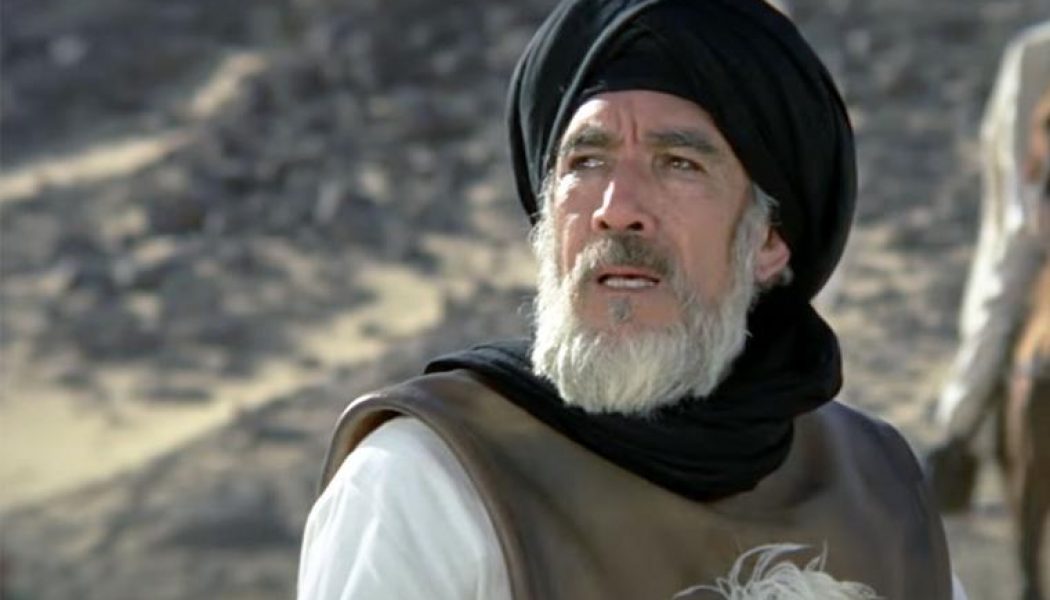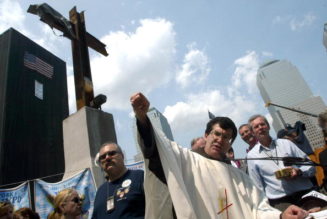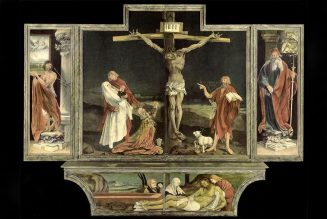
I was at the house of a Secular Franciscan brother. We’d just finished watching an episode of the YouTube series The Chosen on his television. Our conversation steered so that the topic of Islam was raised.
“If you want a better understanding of a Muslim’s perspective,” I told him, “then you really need to see a film called The Message.”
He picked the remote up from the arm of his couch and began searching on YouTube. “Who’s Grandmaster Flash?” he asked.
The Message had indeed shown up on his YouTube search, both the film I’d mentioned to him as well as the official music video of the rap classic. I gave my friend a brief explanation of who Grandmaster Flash was (this brother is in his 80s), and after carefully consideration as to whether he preferred to learn more about pioneering rappers or Islam, he added the film to his watchlist.
The Message is a 1976 Anthony Quinn film that made me feel very proud of Islam back when I was a teenager. I suddenly realized that I’d just recommended a film which I myself hadn’t seen in over 20 years, and so I made the mental note of adding it to my own watchlist.
Syrian-born director Moustapha Akkad (a key producer in the Halloween franchise) had simultaneously filmed both an English and an Arabic (titled Ar-Risalah) version of this film. Akkad, who’d studied film at both UCLA and USC, had dealt with many hurdles — Hollywood rejection compelling him to consider alternatives, Saudi pressure to cease production while he was filming, having to move the filming location from Morocco to Libya because of that Saudi pressure — until his vision was finally realized: a film that would share the life and legends of Muhammad with the world.
As an engaging narrative, The Message rivals the best classic biblical films ever produced by Hollywood. It has the “feel” of a classic epic, and moments fitting for a classic Western. (Anthony Quinn’s first scene felt much like John Wayne riding in to save the hour).
In Islam it’s strictly forbidden to portray the likeness of Muhammad. This restriction is extended to other key figures (such as the “Rightly Guided Caliphs,” or Muhammad’s wives and children) from Islam’s early history. The brilliance of The Message was in how cleverly it dealt with this restriction.
The camera was often pointed, or even mounted on a camel, to show Muhammad’s viewpoint so that Muhammad himself never needed to be shown. When characters spoke to Muhammad, the actors looked directly at the camera. During the scene of the Battle of Badr, Ali’s double-bladed sword was shown waving in the air, but the person of Ali was never shown. As a result, many of early Islam’s lesser-known historical figures (whose likeness it is permissible to show) became central characters, and the audience could be given a better understanding of what would have been the general milieu.
Art can be enhanced greatly when social restrictions compel the exploration of clever alternatives. Conversely, we know from much of the “art” in our own day that a lot of trash gets produced when social restrictions are lacking.
The film’s narrative did portray an oversimplification of the practice of idolatry, which does go a long way toward explaining why aniconism is so strong in Islam. I remembered while watching The Message how statues of Our Lady, or any of the saints, used to make me uncomfortable when I first become a Christian, which helped delay my becoming Catholic for several years. But the narrative, to its credit, didn’t extend this mistake by always oversimplifying non-Muslim characters (and even took a very kindly approach to the Christian king of Abyssinia).
Abu Sufyan (portrayed by Michael Ansara), the film’s chief antagonist, was indeed cruel at times. His cruelty was calculated — Machiavellian rather than sadistic, done for the sake of securing Mecca’s well-being as he understood it. He restrained himself from being cruel, and even restrained his peers, when he saw no logical purpose to it. He had some humanizing moments, and wasn’t treated as a straw-man (a mistake which many Christian-inspiration films, such as God’s Not Dead, do often make nowadays).
The Message is a very detailed movie. The filmmakers had done their homework, so that Hamza (Anthony Quinn) was even shown to be wearing an ostrich feather on his armor during the battle scenes.
I’d noticed moments in which the film’s score (which was nominated for an Oscar) sounded remarkably similar at times to that of Lawrence of Arabia. The reason for this is that composer Maurice Jaffe had written the scores for both. Jack Hildyard, the cinematographer, had also worked on several productions directed by David Lean. John Bloom, the film’s editor, later went on to win an Oscar for his work on Gandhi. This film truly had a professional crew!
This outstanding film articulated so very well exactly what I wanted Islam to be back when I was a Muslim. Watching it again was also an unwitting opportunity for me to witness what I needed to do to sustain my own faith in Islam.
The Message had been targeted for Western audiences, so the film’s narrative needed to be selective.
Khadija (whose likeness couldn’t be shown), Muhammad’s wife while he had lived monogamously, was mentioned several times by the characters and narrator. After her death, which the narrator reported about an hour into the film, any mention of Muhammad being married went silent.
The narrative had a very reconciliatory approach towards Christianity and Judaism, sharing notions that anyone with a “Coexist” bumper sticker could get behind. The battles depicted in the film were always between “innocent” Muslims and “oppressive” polytheists, so that Western audiences presumably wouldn’t have any problem with watching moving images of Khalid ibn al-Walid (played by Michael Forest) nobly riding his horse while leading a large army into Mecca. Western audiences wouldn’t have been so keen to see that same general leading armies into cities of the Byzantine Empire, so it was left out of the narrative.
The Message never made any outright denial of details such as polygamy or the conquests of Christendom. The opening scene, of three messengers delivering invitation to surrounding rulers to join Islam, even strongly hinted at the wars that were soon to come. But hinting was as far as the narrative could go before losing the target audience.
A film with carefully-selected narration can serve as a spin doctor for any historical figure. The Mongol (2007) is one of the very best proofs of this. Like The Message, The Mongol is a story about the sufferings and trials of a visionary hero who ultimately becomes catalyst for the rise of an unlikely and dominant empire. The Mongol very strongly hinted at what would soon be coming, but it never depicted any genocidal acts that would disgust an audience. I watched it in 2008, and found myself doing something I never would’ve previously imagined myself doing: rooting for Genghis Khan!
The sheer scale of destruction does, of course, set the Mongol invasions far apart from any other conquests prior to the 20th century. But a well-crafted story, about anyone, contains a tremendous power to craft our beliefs. And don’t worry — I stopped rooting for Genghis Khan as soon as the credits started rolling.
I was very proud of the Caliphate’s many achievements. At the same time, I didn’t allow myself to consider whether the Sahaba (companions of the prophet) could have been aggressors in any of the wars in which they participated (“for Allah loveth not transgressors” says the Quran 2:190, quoted in The Message), so I compensated by never asking myself questions which in retrospect became rather obvious: how did so much “self-defense” travel all the way to Spain?
I knew that Muhammad was polygamous, and I had heard of other details such as the age of one of his wives. I also understood that the context of 7th-century Arabia was very different from that of 20th-century America, that we ought to tread carefully whenever it comes to holding any person up to the standards of a very different time and place (something widely done by cancel culture).
There is much to admire about Muhammad, but downplaying and overlooking were necessary to sustain the belief that he had lived an example that was “perfect” for all peoples and all times. Much downplaying and overlooking would be necessary for any one of us to be seen as “perfect” in the sight of others.
“Muhammad is only a man,” characters in the film had stated on a few occasions. What I’d once viewed as a bragging point I now view as a concession.
I would never accuse Moustapha Akkad of having been some kind of willful peddler of propaganda, because I do very much believe that the sincerity of his intentions drove this film to be so beautifully made. The difference is that I now know that the maintenance of such sincerity often demands that we downplay and overlook certain details.
For me, The Message was a representation of the “true Islam” I was so very proud of — the solution, I thought, to so many of the world’s problems.
The Message was released shortly after the Civil Rights Movement in our own country, and shortly after the Roe v. Wade decision. The film depicted the freeing of slaves, all of whom were portrayed as African even though the slave population of 7th-century Arabia was far more diverse than in the Antebellum South. Bilal ibn Rabah (portrayed by Johnny Sekka) served throughout the film as a poster child of sorts, proof of the equality of all peoples in Islam. The practice of female infanticide, which was abolished by Islam, was also mentioned several times. Islam, as a result, was presented as the solution to the West’s moral failures.
The West, without a doubt, has her share of moral failures, both historic and modern expressions of dehumanization. The Muslim world has many of those exact same moral failures.
Saudi Arabia finally abolished slavery in 1962 (that’s not a typo), largely as a result of American diplomatic pressure to do so. The great landmark structures in oil-rich cities such as Dubai and Doha have been built by the hands of the migrant workers (many of whom come from my mother’s native Pakistan) living under conditions that amount to indentured servitude; people from the Philippines and the Indian subcontinent certainly aren’t treated as equals there, even if they happen to be Muslim. Abortion laws are more diverse throughout the Muslim world — to their credit, abortion-on-demand remains illegal in many Muslim-majority countries — but there are countries, such as Turkey and Tunisia, that have taken the same dark path that we have.
Having an ideal of a “true Islam” as presented in the film, or having any ideal for that matter, isn’t enough to rescue those of in the West, nor those in the Muslim world, from the darkness lurking in our hearts which causes us to fall short of our ideals. The Old Testament is a record of our problematic relationship with ideals — that we’re simply too human to make any of them work.
All of us are too human for ideals to judge ourselves and our neighbors by. We’re made more aware of ourselves, that we may thus be saved from ourselves, by admitting that we routinely fail to live up to what we’re supposed to be. The Sacrament of Reconciliation is thus an incredible mercy — that we may be excused from our sins so long as we quit making excuses for ourselves.
When I was a Muslim, I considered those who engaged in terrorism to have a distorted view of “true Islam.” Those who had more sympathetic views toward terrorism (which is so often committed under the guise of “self-defense”) also had preferred narratives which made a less innocuous “true Islam” that all of us were supposed to abide by.
The director of The Message was himself the victim of a less innocuous interpretation of “true Islam.” Moustapha Akkad and his daughter were in the wrong place, at the wrong time, when Al-Qaeda in Iraq conducted a series of bombings in Amman, Jordan, on Nov. 9, 2005. She was killed immediately. He succumbed to his injuries two days later. A man who’d rendered such quality service for his faith was murdered by men acting in the name of that same faith.
I’d introduced my Secular Franciscan brother to the film shortly after he’d introduced me to The Chosen on YouTube. The narrative of any film about Our Lord does likewise need to be selective, because there are time constraints. We never have to excuse him, nor do we have to overlook any of his deeds, for having been a product of his times (although we routinely need him to forgive us for being products of our times), and that is the true earmark of the perfect life. We follow him today because he is the Prince of Peace who forgives sinners for falling short of the ideal. He is fully God, and fully man.
There are some very compelling stories. There is also the greatest story ever told.
[embedded content]
Join Our Telegram Group : Salvation & Prosperity








